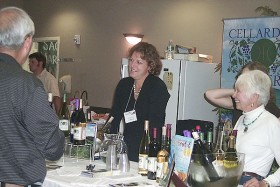 Maine wine and spirit makers face an uphill battle to win market share, but they are welcoming the challenge.
Maine wine and spirit makers face an uphill battle to win market share, but they are welcoming the challenge.
C.C. Peet of Cellardoor Winery in Lincolnville, Steve Linne of Blacksmiths Winery in South Casco, Bob Bartlett of Bartlett’s Winery in Gouldsboro and Bob Harkins of Cold River Vodka in Freeport detailed the challenges of the wine and spirit business during a panel discussion Saturday at the fourth annual Maine Fare celebration.
Maine Fare’s goal is to assist in preserving, protecting and sharing Maine’s culinary history and resources. The event highlighted Maine products through panel discussions, tastings, exhibits and samplings. The wine and spirit panel was moderated by Jack Scully of Belfast’s Easterly Wine.
All agreed that the key thing they have working for them is the Maine brand. Whether marketing wine or spirits, having a product that is made in Maine makes it easier to attract buyers.
“There is a tremendous loyalty to Maine-made and -grown foods,” Scully said. “The possibility for growth in the wine and spirit field is terrific. I think the growth of Maine products both inside the state and outside the state has great potential.”
All three vintners said that because wine has a certain “snob factor,” it’s difficult to convince buyers that wines made of blueberries and other fruits can match up with grape wines from France or California. Bartlett, who has been in the business more than 30 years, said some wine drinkers are reluctant to sample his wines simply because they are made from fruit. He said working with restaurants individually is one way of overcoming that problem.
“The quality is there, it’s the marketing that has to be addressed,” he said. “We like to have a dialogue with chefs, but it’s tough.”
Bartlett said wild blueberries and apples grow well in Maine and offer the best opportunity to develop a local product. He said he tried to grow grapes a decade ago but did not have much success.
Linne said another way to promote their product is to put more effort into convincing customers to sample their wines. He said wine buyers are cautious about making mistakes when selecting a vintage so they tend to stick with traditional vintages and vineyards. It is much safer to recommend a wine from California than a fruit wine from Maine. He noted that Maine-made wines represent about 0.8 percent of overall wine sales in the state.
“The issue with wine is people don’t want to make a mistake and that translates to the distributor, the restaurant owner and the server,” Linne said. “If you want to grow in the wine market we need to drive customers to our tasting rooms.”
Harkins said he has been successful marketing Cold River Vodka in the state but has run into stronger competition in states where distribution is controlled by large corporations. He said the fact that his product is made from Maine potatoes and pure spring water gives it a taste all its own. He said restaurant owners like the taste and are recommending it more and more.
“Those large distributors tend to push their own brands while the little guy is in the corner of the warehouse is gathering dust,” Harkins said. “We do not compete on price at all, we compete on quality. … We want to become a national and international brand. We’re in 19 states and Canada. We try to get on specialty drink lists. You get on a drink list and you’re going to sell a lot of vodka or wine.”
Peet said Cellardoor’s wines are made from grapes imported from other growing regions. She said Maine’s cold winters and cool summers are not conducive to wine grapes, although the winery this year planted a hybrid grape from Wisconsin and it should know in three years whether the grapes will be suitable for making wine. Heat is needed to balance the acids and sugars in grapes, and cool summers make that difficult. In addition, one severe winter can ruin investment in a vineyard.
“We have to get past the stigma that [wine] has to be grown locally,” Peet said. “I don’t think all Maine wines will be from Maine grapes. We have to import the grapes to make it work.”
Article and Photo by: Walter Griffin
